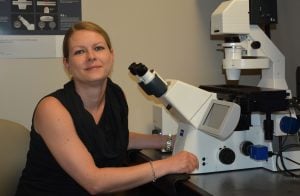 Name of Institution:
Name of Institution:
Mayo Clinic Jacksonville, Department of Neuroscience
Project Title:
Pathophysiological relevance of phospho-ubiquitin to genetic and environmental Parkinsonism
Investigator:
Fabienne Fiesel, PhD (Post-Doctoral Researcher and Grantee)
Dr. Fiesel, is an Instructor for Neuroscience in the Department of Neuroscience at Mayo Clinic in Florida. She received her MSc in Biology from the University of Stuttgart in 2005 and earned a PhD in 2010 from the Eberhard-Karls-University in Tuebingen, Germany. She then continued her training as a post-doctoral fellow in the laboratory of Dr. Philipp Kahle at the Hertie-Institute for Clinical Brain Research, Germany before joining the lab of Dr. Wolfdieter Springer at Mayo Clinic, Jacksonville in late 2011. She is interested in the molecular and cellular mechanisms contributing to Parkinson’s Disease and has developed screening assays for the detection of Parkin activation by automated High Content imaging. These have been used to identify Parkin’s coenzymes in a functional genetics approach and to determine defects of Parkin mutations that have been genetically associated to PD.
Wolfdieter Springer, PhD (Postdoctoral supervisor)
Research Objectives and Relevance to Diagnosis/Treatment of PD:
Mitochondrial dysfunction is increasingly appreciated as a key determinant of dopaminergic neuronal susceptibility in Parkinson’s Disease and is a feature of both familial and sporadic disease, as well as in toxin-induced Parkinsonism. The goal of this study is to explain the presence of mitochondrial stress upon treatment of cells with Parkinson’s Disease toxins and in human brain samples from patients with sporadic PD. This study will help to better determine the role of mitochondrial dysfunction for disease pathogenesis and will help to establish mitochondrial quality control as a potential therapeutic target.
2016 Progress Update:
We have established phospho-ubiquitin antibodies as sensitive tools to study the activation of the PINK1 and Parkin-dependent mitochondrial quality control pathway. We find that the presence of phospho-ubiquitin is dependent on both intact PINK1 and Parkin function. Phospho-ubiquitin acts as a specific label for damaged mitochondria destined for degradation. Phospho-ubiquitin is induced upon treatment of cells with mitochondrial and environmental, parkinsonian toxins such as Rotenone and Paraquat. Consistent with a role for phospho-ubiquitin as the ‘mitophagy tag’ it partially co-localizes with mitochondrial and lysosomal markers. Moreover, in post mortem brain samples we find elevated phospho-ubiquitin in tissues from aged individuals and further increased levels in tissues from individuals with sporadic PD. Our data therefore indicates that mitochondrial quality control is activated during disease pathogenesis in sporadic PD. This study is the first essential step to demonstrate the link between different forms of Parkinson’s Disease and to quantify their convergence on the level of mitochondrial quality control activation and execution. We have established phospho-ubiquitin as a novel biomarker and potential therapeutic target that can be further explored to unravel the exact interplay and extent of pathogenic overlap in environmental, genetic as well as sporadic forms of PD.
